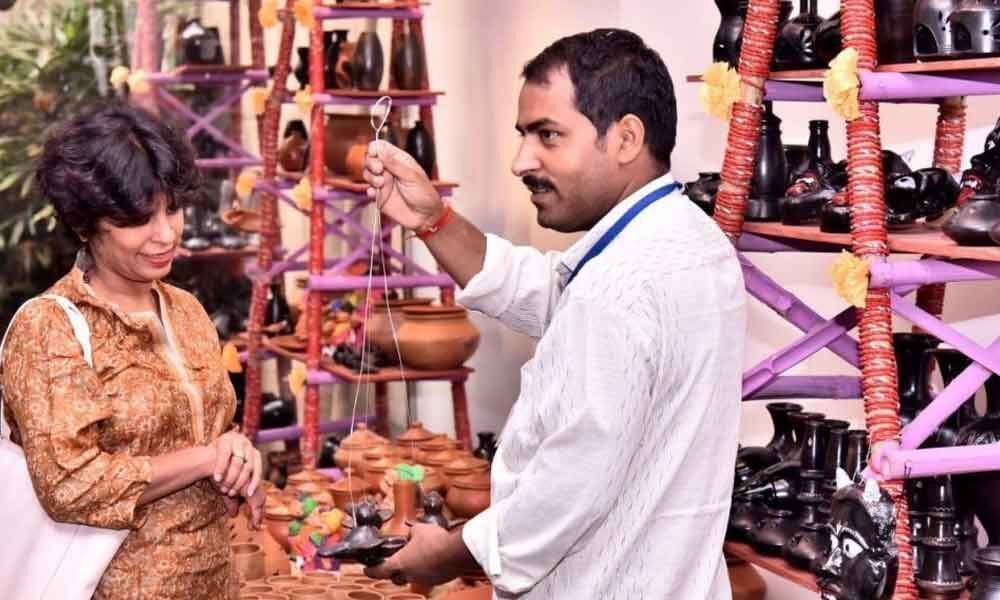An ex-bureaucrat's quest to preserve rural heritage

Even after giving almost 40 years of his life to government service, retired civil servant S K Misra felt his work was still not complete.
Even after giving almost 40 years of his life to government service, retired civil servant S K Misra felt his work was still not complete. The former bureaucrat felt that the experience he had gained and the reputation he had built could be better used for public service. Thus, began his second innings.
After he retired as the Principal Secretary to former Prime Minister Chandra Shekhar in the early 1990s, Misra continued his work in the fields of conservation and restoration of heritage, rural development, women empowerment and community engagement.
Standing strong at 87, the Padma Bhushan recipient heads the Indian Trust for Rural Heritage and Development (ITRHD), a non-governmental organisation set up in 2011 that works in villages with strong, often endangered, heritage traditions with projects spread across eight states.
"I could never think of total retirement or sitting idle. I felt that the experience that I had gained, I should put that experience to social purpose.
I am 87-years-old now and I still can't think of just relaxing," Misra, who also served as Tourism, Civil Aviation and Agriculture Secretary in the Union government and was also Principal Secretary to three Haryana Chief Ministers, said.
He added that other officers who gain experience should not just hang up their boots after retirement but should continue to work "as there are so many areas where work needs to be done and where their experience could be utilised".
After retirement, Misra served as the Chairman of Indian National Trust for Art and Cultural Heritage (INTACH), the biggest NGO in the country concerned with restoration of heritage, for almost 10 years.
But, the need for an organisation focusing solely on rural heritage, birthed ITRHD.
"INTACH was primarily urban oriented and was concerned only with conservation.
The new NGO, formed in collaboration with a number of distinguished persons from different walks of life, was concerned with conservation of rural heritage and also rural development along with community involvement," he said.
Founded with the aim of helping create sustainable viability for heritage while also focusing on its potential as a resource for overall development, his NGO concentrates on infrastructure development, primary education, skill development, employment generation, and development of rural tourism.
"In all our projects, the goal is not only to preserve important heritage assets for their own meaning and value, but to help the impoverished rural communities that own them to learn how to successfully manage previously unrecognized heritage resources, in the process achieving self-sufficiency, improved living conditions, and a new sense of pride as owners of these special and most precious parts of our culture," Misra said.
While in Jharkhand, ITRHD is working on restoration of 17th century terracotta temples and restoration of a historic jail, in Haryana's Mewat district, it has undertaken a project to restore an extraordinary 700-year-old monument, the Dargah of Sheikh Musa - a medieval Sufi saint.
"In the Maluti village in Jharkhand, there is a unique heritage site with 62 terra-cotta temples.
There were 108 temples and now only 62 remain - all in one village," While Misra took the initiative to conserve and protect these unique monuments in 2011, the Jharkhand government in 2015 agreed to fund the entire project with a budget of Rs 7 crore.
"The work is going on and we hope to complete it by end of this year," the former bureaucrat said.
"In addition, the state government has also entrusted a project of conserving a historical jail in Ranchi which housed freedom fighters of the tribe called Munda.
After restoration, it is to be converted into a tribal museum," he added. Started late last year, the project is expected to be completed by 2019 end.
In Uttar Pradesh's Azamgarh district, Misra's NGO is working on an initiative to preserve the heritage of an "unusual cluster of historical creativity" of three villages - Nizamabad, Mubarakpur and Hariharpur.
Holding India's rich cultural heritage and soft power, Hariharpur has a long classical music tradition, Nizamabad a unique tradition of black pottery, and Mubarakpur thousands of fine silk weavers.
"We now organize Azamgarh Festivals annually in both Delhi and Lucknow, at which the artists and musicians from all three villages not only attract new patronage and new support, but also are creating new appreciation for the cultural riches of Azamgarh," Misra said.
He realised during his stint as Tourism Secretary that craftsmen need patronage which tourism could provide, he added. "Earlier, they had patronage of Maharajas but that had disappeared. So, I felt that tourism can fill that vacuum."
This was when he started Surajkund Crafts Mela in 1986 which has now become a global event with about 14 lakh people attending this year, including 60,000 foreigners.
Misra says that this benefited craftsmen and its success inspired him to continue similar work even after his retirement.

